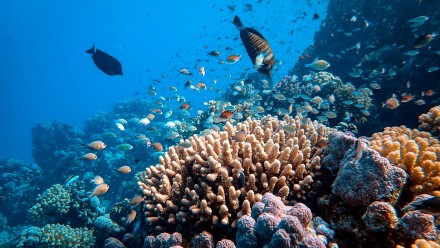Celebrating our oceans: From Australia to the Pacific to Antarctica
Oceans act as life support systems for our planet. Our fresh water, weather, climate, coastlines, much of our food, and even the oxygen in the air we breathe, are all ultimately provided and regulated by the sea. Oceans are the world’s largest ecosystem, home to a vast array of incredibly diverse plants and animals. Unfortunately our oceans are at risk from multiple threats, including climate change, marine debris and over-exploitation from fishing and tourism.
To celebrate World Oceans’ Day, join us to learn and discuss the challenges to the health of our oceans and marine resources and what can be done to protect them.
This event will consist of presentations from ocean and Pacific experts interspersed with short videos outlining the actions that various countries are taking to protect the oceans, followed by audience Q&A.
Drinks and light refreshments will be available after the event.
Presentations:
• Coral reefs and climate change - Dr Jennie Mallela, Research School of Biology, Australian National University
• The Fate of Pacific Islands: Facing Sea Level Rise and Climate Change with Resilience - Prof Elisabeth Holland, Director of the Pacific Centre for Environment and Sustainable Development, University of the South Pacific
• Polar POD: a 3-year circumnavigation to explore biodiversity and oceanography of the Southern Ocean - Prof David Antoine, Head of the Remote Sensing and Satellite Research Group, Curtin University
3 minute videos:
Olivier Poivre d’Avor, Ambassador for the Oceans and the Poles, France
Representative of the Federal Ministry of Education and Research, Germany
Orazio Guanciale, Special Envoy for Pacific Islands and coordinator for Antarctica, Italy
UK speaker TBC
Moderator: Prof Andy Hogg, Research School of Earth Sciences, Australian National University
This event is hosted by the Embassies of France, Italy, and Germany respectively, the UK High Commission and the ANU Institute for Climate, Energy & Disaster Solutions.
Getting to the venue
You can find information on how to get to the venue, either by bike, public transport, or driving, here on our website.
Join the livestream via YouTube - Please register for the ticket named - "Online attendance" and the link will be sent to your nominated email the day prior to the event. We will also post the link here on the day.
COVID-19 Information
There is a low risk factor at this event for the spread of COVID-19, however, there will be precautions in place to ensure that everyone's health and safety is a priority. If you are sick or have symptoms or if you have recently travelled to/from a corona hot spot or overseas recently, please do not attend this event in person. We will be providing hand sanitizer at multiple locations for your use, please clean your hands often and minimise touching you face; we also recommend that you wear a mask when at this event. There will be signage and protocol officers in attendance to help keep you informed on COVID safe practices. If you attend, we will keep a record of your name and contact details for 28 days for contact tracing purposes.
PLEASE NOTE - All in-person attendees are required to check in at the venue using the ACT Government Check in CBR app. This is to ensure that the event is compliant with ACT Government protocols around hosting COVID safe events.
If you are unable to download the app on your phone due to it not having the software capacity, but still wish to attend in person, our staff will check you in using the Check in CBR app on their device upon your arrival. If you do not have your details recorded in the Check in CBR app then you will not be permitted to enter the venue.
By registering for this event you are also subscribing to the ANU Institute for Climate, Energy & Disaster Solutions mailing list. You can unsubscribe at any time by clicking on the unsubscribe button at the bottom of correspondence.
Header photo credit: Francesco Ungaro/Unsplash








